Home > About Us > UNHCR People > Prominent Refugees
Prominent Refugees
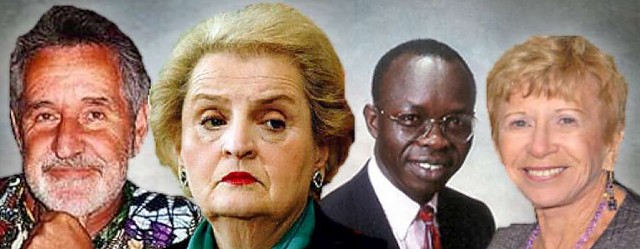
Refugees Who Have Made a Difference
Refugees or former refugees who have achieved special status within a community due to their achievements, or because they have overcome hardship to build a new life.
This gallery features profiles of some 200 refugees who have made a difference and left a mark in the world. The list includes people, dead and living, in all walks of life. Some, like writer Chinua Achebe, composer Bela Bartok, physicist Albert Einstein and actress-singer Marlene Dietrich are world famous, others have shared their gifts locally. The UN refugee agency salutes all of them for showing the potential of refugees around the world.

"Home and Exile" is the title of a book of essays by prize-winning Biafran poet and novelist Chinua Achebe, and it is a theme he knows something about.
Achebe was born and raised in Biafra, and his life has been shaped by the civil war that has torn his country apart.
At school he read the works of British writers such as Charles Dickens, William Shakespeare and Joseph Conrad. He could not recognise the Africans portrayed in these works, and as he felt himself identifying more with the white characters, he began to worry he was forsaking his African roots. He was particularly irritated by the portrayal of Nigeria in Joyce Cary's 1939 novel, "Mister Johnson". At University College, Ibadan, he switched from medicine to the arts, and decided to become a writer.
Achebe published short stories about Nigeria as an undergraduate, but it was with the publication of his first novel "Things Fall Apart" (1958) that his international reputation was established. It became a seminal text of postcolonial literature and he is seen as a founding father of the African novel.
Subsequently, he has written other novels, including "A Man of the People" (1966) and "Anthills of the Savannah" (1987), as well as a wide range of short stories, poems, essays, and articles. He has received numerous awards for his work, including the 1972 Commonwealth Poetry Prize for "Christmas in Biafra", as well as honorary doctorates from universities around the world.
By the time the civil war broke out, Achebe had become known as one of Nigeria's leading novelists and publishers. In "A Man of the People" (1966), a satire on political corruption, he predicted the fall of civilian government. The novel's publication in January 1966, did, in fact, coincide with a coup d'état that plunged the nation into chaos.
Achebe remained in Nigeria during the Biafran war, and threw himself into the cause of the Igbo people. He became Biafran Minister of Information, and travelled the world to raise awareness of the suffering of the Biafrans.
In 1990 a car accident outside Lagos left him paralysed from the waist down. He sought medical care in the United States, and has been teaching literature at Bard College, California, while waiting for the situation in Nigeria to improve so that he can return home on a permanent basis. He recently went back to Nigeria for a visit that inspired "Home and Exile", published in 2000.
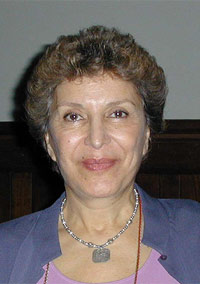
Mahnaz Afkhami was one of two women cabinet ministers in pre-revolutionary Iran. The other woman, Farrokhrou Parsa, Minister of Education, was arrested and shot in the early days of the Islamic revolution.
Before the revolution, Afkhami was Secretary-General of the Woman's Organisation of Iran. In November 1978, she went to the United Nations in New York as head of the Iranian delegation to negotiate the terms of an agreement to set up an international research institute for women in Teheran. Her husband called to warn her that if she returned as planned, she would very likely be arrested. Islamic revolutionaries were condemning her for her feminist activities, and she had already lost her post as Minister of State for Women's Affairs a few months earlier in an attempt by the government of the Shah to appease the revolutionaries. With just a temporary visa and no plans, Afkhami stayed on.
Afkhami's work in Iran involved setting up a grassroots network of feminist centres, called Women's Houses. They offered skills training, job counselling, childcare, healthcare and family planning services. In a collection of essays edited by Afkhami, "In the Eye of the Storm" (1994), she describes the progress women had made in Iran before the revolution, including gaining the right to vote in 1963 and winning representation in government. Many of these rights were subsequently abolished by the Islamic regime.
Afkhami's book, "Women in Exile", is a composite of 12 stories of women from all over the world for whom exile meant not only "struggle, fear, violence, chance, choice, loss, dislocation, puzzlement", but also "restructuring, a rebirth". She has also written, co-authored, and edited a number of books, among them a manual on human rights education in Muslim societies, "Claiming Our Rights" (1995).
Exiled in Washington, Afkhami established the Foundation for Iranian Studies, www.fis-Iran.org, of which she is currently the Executive Director. The Foundation serves as a research centre dedicated to the preservation and transmission of Iran's cultural heritage to the next generation of Iranians abroad, of whom over two million reside in Europe and the United States. She hopes it will also help break the present day stereotypes of Persian civilisation in the West.
Afkhami has written and lectured extensively on the international women's movement. She served as President of the Sisterhood is Global Institute, an international feminist think tank, and is now president of the Women's Learning Partnership for Rights, Development, and Peace, a non-governmental organisation.
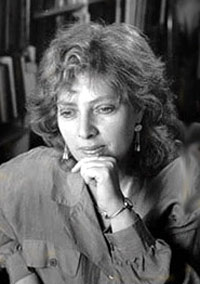
Chilean women depicted the hardship of everyday life at the time of the Pinochet dictatorship with tapestries made from scraps of material, and writer Marjorie Agosín has highlighted how the production of these arpilleras became a movement with socio-political implications.
The granddaughter of Jewish refugees who fled Nazi persecution for Latin America, Agosín grew up partly in Chile, and partly abroad where her father worked as a scientist. At the time of the 1973 coup in Chile, she was living in the United States and she felt she had lost her home country. Although there was no formal barrier to their return, her father did not want to raise his three children in what he considered a nation under occupation.
Agosín received a doctorate in Latin American literature from Indiana University. In 1990 she went to Argentina as a Fulbright scholar. On visits to Chile, she discovered tapestries known as arpilleras that depicted the hardship of women's daily lives. She decided to document the movement, writing two books on the art form and its socio-political implications - "Scraps of Life: Chilean Women and the Pinochet Dictatorship" (1987), and "Tapestries of Hope, Threads of Love: The Arpillera Movement in Chile 1974-94" (1996).
Agosín began working with the mothers of the "disappeared" in Chile, gathering oral testimonies of human rights abuses. As her human rights activities increased, she was threatened, and told to leave and not return.
"There are many levels of belonging," she says. "I belong to Chile mostly through the language, through my poems. I believe in (Polish Nobel prizewinner) Ceslaw Milosz's concept of language as the only homeland. Maybe no one really has a home except one that he invents."
She has also addressed her Jewish heritage, writing about her parents in "Always from Somewhere Else: A Memoir of My Jewish Father" and "A Cross and a Star: Memories of a Jewish Girl in Chile".
In "The Alphabet in my Hands: A Writing", Agosín focuses on her own exile. She has also collected and translated the work of Latin American women poets in "Landscapes of a New Land: Fiction by Latin American Women" (1989). To mark the 50th anniversary of the UN Declaration of Human Rights, she wrote "An Absence of Shadows", a bilingual volume of poems in homage to the "disappeared". In 1999 she edited an anthology of women writers who have been victims, survivors or witnesses of human rights violations, "A Map of Hope: Women's Writing on Human Rights: An International Literary Anthology".
Agosín teaches Spanish at Wellesley College in Massachusetts. Although living in the US, she makes regular visits to Chile.
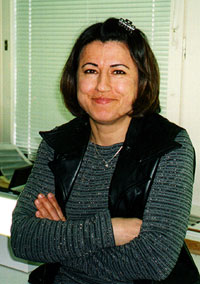
Sonya Aho was one of the first Assyrian refugees to settle in Sweden in the 1970s, and she has used her experience of life as a refugee to produce prize-winning journalism about her community.
Born in Midyat in south-eastern Turkey, Aho fled from persecution with her family at the age of four. Growing up in the historic port of Södertälje, not far from Stockholm, her friends and social activities were all Swedish. Later, there were large influxes of Assyrian refugees - from Turkey in the 1970s, and from Lebanon and Syria in the 1980s. Today, Södertälje is home to 15,000 of the 70,000-strong Assyrian community in Sweden.
It was only during a stay in multicultural London that she realised how many people belonged to mixed backgrounds, and were proud of it. She began to improve her Assyrian, and decided to visit the country of her birth. In Turkey, she met a cousin who was facing a three-year jail sentence for campaigning for the rights of the Christian ethnic Assyrian minority.
In 1986, Aho began working for Swedish television. In 1990 she began a two-year documentary project that traced the Assyrian origins of the inhabitants of Södertälje. She visited historical Assyrian sites and present-day communities in Iraq, Turkey and Israel. In 1989, her newspaper, Länstidningen, was awarded a prestigious Swedish journalism prize for its coverage of the Assyrian and other immigrant communities living in Sweden.
Today, Aho is stressing the need to preserve her national identity and a cultural heritage that is at risk of disappearing. Her children are learning the Assyrian language. "The very fact of not having a country to go back to, a country that preserves and keeps up the language and culture, means that for the individual in the Diaspora, the transmission of his culture becomes imperative in order to avoid its disappearance," she says.
Since 1998, Aho has served as Chair of the women's section of Samarbetsorgan fur Invandaraorganisationes i.Sverige (Ethnic Minorities Group of Sweden), an umbrella organisation that has over 120,000 members. Aho is interested in women's issues, such as the need to improve women's access to the labour market, education and parent counselling.
She is currently writing a book that involves a series of portraits of women from different cultural backgrounds and reflects varying experiences of immigration.

Madeleine Albright was the United States' first female Secretary of State and the highest-ranking woman in the history of the US government.
She was born Marie Jana Korbelova (Madeleine is the anglicised form of Madlenka, her childhood nickname). Twice, the Korbels were forced from their homeland due to political turmoil. When the Nazis invaded Czechoslovakia during World War II, the family fled to England. They returned to Prague when Albright's father, a diplomat, took a position with his government in the brief period between the liberation from the Germans and the Communist coup of 1948. However, because of the Communist takeover, the Korbels once again had to leave the country.
They immigrated to the United States in 1948 when Albright was 11 years old, and settled in Denver, Colorado, where her father took a teaching position in international relations at the University of Denver. In her Denver high school, Albright - then Madeleine Korbel - won a UN-sponsored competition by correctly naming all the organisation's member states.
Though raised as a Catholic and later married into the Episcopal Church, reports in the wake of her nomination to Secretary of State suggested that Albright has Jewish ancestry. Birth certificates and records unearthed in Europe indicated that many of the family's relatives who stayed in Europe, including Albright's grandparents on both sides, died in concentration camps.
Albright attended Wellesley College and soon after graduation, married Joseph Albright, the son of newspaper publishers. She went into politics, and in the following years she served, among other things, as the President of the Center for National Policy.
By 1988, Albright was advising Democratic presidential candidate Michael Dukakis. A few years later, President Bill Clinton named her as his Permanent Representative to the United Nations. Albright was nominated as Secretary of State by President Clinton on December 5, 1996. After being unanimously confirmed by the US Senate, she was sworn in as the 64th Secretary of State on January 23, 1997.
In 1998, Albright commemorated 50 years in the United States by speaking at a naturalisation ceremony for nearly 100 new American citizens. Reflecting on her own background as a refugee, she said to the group: "Today marks a new beginning in your lives. And an ongoing chapter in the story of America which is, above all else, the story of immigrants".
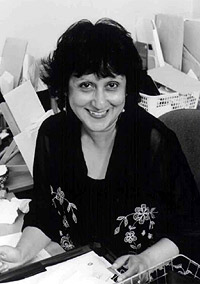
Yasmin Alibhai-Brown left Uganda for the United Kingdom in 1972 following Idi Amin's rise to power and the subsequent expulsion of all Ugandan Asians from the country. In her adopted country she has become a leading writer and commentator on race relations.
Alibhai-Brown did a masters degree in literature at Oxford University and went on to teach adults, particularly immigrants and refugees. She has worked as a journalist for The Guardian, New Statesman and other newspapers. She is now a regular columnist for The Independent, and has also made her mark as a radio and television broadcaster.
Since 1996, she has been a Research Fellow at the Institute of Public Policy Research. In June 1999, she became a Senior Research Fellow at the Foreign Policy Centre. In the same year, she received an honorary degree from the Open University for contributions to social justice and won the BBC TV Asia award for her writing.
Alibhai-Brown is a member of the British government's Home Office Race Forum, and advises various key institutions on race matters. Her articles on forced marriages and the maltreatment of Asian girls in Britain by their families made the government take up the issue. Since then, she has been working with ministers on numerous matters affecting the Asian community.
She has written several books, including "No Place Like Home", an autobiographical account of an immigrant's experience, and "True Colours", which investigates the role of the government on racial attitudes. Her latest works, "Who Do We Think We Are?" and "After Multiculturalism", both critical analyses of British society, race and ethnicity, were published in 2000.
Alibhai-Brown is Vice-President of the United Nations Association, and a special ambassador for the Samaritans counselling organisation.
Her dedication to immigration issues was once again demonstrated on July 12, 2000, when she led a moving memorial service for the 58 Chinese immigrants found dead in the back of a lorry in the channel port of Dover.
Alibhai-Brown lives in London and is married with two children.

"Often I had no alternative but to work hard in order to survive and protect my family. I was a political exile and then an immigrant. That makes one strong." This is how Chilean writer Isabel Allende answered when asked what gave her the drive to achieve. Her novels have become world-famous modern Latin American classics.
She went into exile after her uncle, Chilean President Salvador Allende, was overthrown in the military coup led by General Augusto Pinochet on September 11, 1973. Isabel had been receiving death threats and learnt that her name was on a military blacklist. She fled to Venezuela with her husband and two children, arriving without a visa or a job, but managed to continue her career as a journalist by contributing to the Caracas newspaper, El Nacional.
In 1981, when she received news that her 99-year-old grandfather was dying, Isabel began writing him a letter to make herself feel closer to her family and the home she left behind. The manuscript was to turn into her first and best-known novel, "The House of the Spirits".
The book tells the story of a family in an unnamed Latin American country that bears an unmistakable resemblance to Chile. The matriarchal Clara del Valle is gifted in strange ways with telepathy and an ability to see into the future. The writing draws on the Latin American tradition of "magic realism". The family lives through turbulent times and, like Isabel's, is caught up in the politics of the day. The New York Times described "The House of the Spirits" as "a spectacular first novel". The Washington Post acclaimed it as "mesmerising". Other novels include "Eva Luna" and "Of Love and Shadows".
In 1985, Isabel went to the United States as a visiting professor of literature. She met her second husband and now resides in San Rafael, California. She is involved in more than 20 non-governmental organisations, including Madre, which provides support for women and children who have been abused, and Canal Community Alliance, which assists ethnic groups. Her own foundation, the Isabel Allende Foundation and Paula Scholarships, was set up at the request of her daughter, Paula, who died in 1992. It allocates scholarships to underprivileged women and children.
In 1990, when democracy was re-established in Chile, Isabel returned after 15 years of absence to receive the Gabriela Mistral Award, a prestigious national prize.
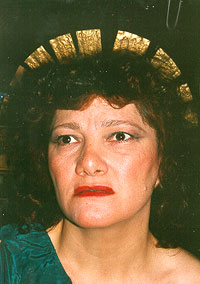
When actress Namaá Alward sought refuge in Norway, the police asked her if she was acquainted with the country. She answered that she knew it through the world-famous Norwegian playwright, Ibsen.
For during the International Women's Year in 1975, Alward had played Nora in Ibsen's "A Doll's House" at the National Theatre of Baghdad. She was a well-known performer, having been awarded the national prize for best actress at the age of 19.
But in 1982, during the Iran-Iraq war, she fled her country. Alward's human rights activities meant she was harassed by the Iraqi police. She feared the consequences for her children and decided to leave the country with her family, travelling for five years across several Arab countries.
While living in a Norwegian refugee camp, she began a dancing group which, with the help of the Anti-Racist Centre, staged plays such as "Welcome" and "Arabian Nights". Soon Alward also began performing in theatre and film. She is remembered for her performance in "The Magic Lantern" during the Olympic Winter Games in Lillehammer in 1994. In 1995 she led a theatre workshop called the Nordic Train of Cultural Freedom, part of the European Council's youth campaign against racism and intolerance. She also appeared in "The Wedding", a Norwegian film that addresses the issues facing Muslim women and their lives in a foreign country.
Currently Alward divides her time between playing consultant to Norwegian People's Aid and the theatre group she co-founded, aptly named Nora.
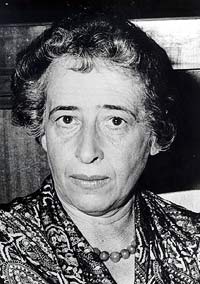
Philosopher Hannah Arendt, the author of "The Origins of Totalitarianism" and "The Banality of Evil", had experienced the rise of the Nazis and was part of the large Jewish diaspora that fled Nazi Germany before World War II.
During the Weimar Republic, she was a student of philosophers Martin Heidegger and Karl Jaspers. In 1929, she completed her doctorate on the idea of love in the writings of St. Augustine.
In 1933, she began working for the German Zionist Organization to publicise the plight of the victims of Nazism, and carried out research on anti-Semitic propaganda. For this, she was arrested by the Gestapo. After winning the sympathy of a Berlin jailer, she escaped first to Geneva and then to Paris, where she remained for the rest of the decade. Working for Youth Aliyah, a refugee organisation, she helped rescue Jewish children from the Third Reich and bring them to Palestine.
When the German army invaded France in 1940, Arendt was separated from her husband and interned in Gurs camp in the Pyrenees, together with 6,000 other stateless Germans. She managed to escape and in May 1941 reached the United States, where she was later granted US citizenship.
Despite the difficulty of not knowing English, Arendt began writing reviews and articles. She nonetheless continued to write in German. When asked by a journalist why she remained faithful to the German language despite the rise of Nazism, she answered: "Well, it's certainly not the German language that went crazy." She was an important cross-cultural reference point for the New York intelligentsia. Serving as an editor for a German Jewish publishing house, she was the first to bring existentialism and the writings of Franz Kafka to the US.
In 1951, she published "The Origins of Totalitarianism", revealing her flair for grand historical generalisations as she traced the steps towards the distinctive 20th-century tyrannies of Hitler and Stalin.
"The Banality of Evil" led Jewish community leader Gershom Scholem to accuse her of having betrayed her love for the Jewish people by her writing. Arendt answered by denying that she harboured any special love for the Jewish people: " You are perfectly right, I am not animated by any sort of love, in my life I have never loved a population or a collectivity - not the Germans, nor the French, nor the Americans, nor the working class, nothing of the sort. I only love my friends, the only form of love I know is the love for individuals."
Yet she dedicated much of her time and writings to Jewish culture. She supported the Judah Magnes foundation that called for an Arab-Jewish confederation for the Palestinian question. From 1944-46, she directed the Jewish Cultural Reconstruction Commission, drawing up an inventory of Jewish books and artefacts plundered by the Nazis, which she subsequently helped recover in Europe.
Arendt taught political theory in Princeton, Berkeley, the University of Chicago, Columbia, Northwestern and Cornell universities and the New School for Social Research. She died in New York on December 4,1975.
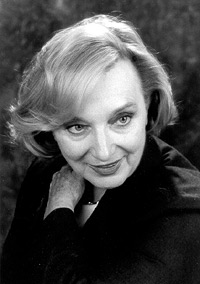
When Christine Arnothy fled on foot from Hungary with her parents, her notebooks were sewn into the lining of her coat. Her best-selling first novel, "I Am Fifteen And I Do Not Want To Die", is a testimony to the extraordinary courage she displayed as a teenager and her determination to use her writer's gift.
Arnothy spent her childhood in Budapest. When the Russian army entered the Hungarian capital, the population hid in basements and the youngster wrote her daily journal by candlelight. After seeking refuge in Austria in 1948, she rewrote it all in French while living in a camp for displaced persons.
She studied at a French-speaking high school in Austria and carried on writing. In 1954, she found herself in Belgium, still stateless. There she submitted the manuscript of "I Am Fifteen" ("J'ai quinze ans et je ne veux pas mourir") for a literary competition. She won the Grand Prix Vérité and the novel was subsequently translated into 27 languages. The book has become recommended reading in many schools. Her second novel was "Dieu est en retard" ("God is Late") and her third book, "Il n'est pas si facile de vivre" ("It Is Not So Easy To Live"), describes the travels of a stateless young woman without a passport.
Arnothy continued her studies at the Sorbonne in Paris. She married Claude Bellanger, a prominent French newspaper publisher. Other novels include "The Captive Cardinal" (1962), "The American Season" (1964) and the prize-winning "The Black Garden" (1966), a violent indictment of racism and anti-Semitism in particular. A collection of short stories, "Le Cavalier Mongol", received a prize from the French Academy.
The first time she returned to Hungary, she was presented with the Golden Cross of the Republic of Hungary, the highest Hungarian decoration given to a foreign citizen. Hungarian President Arpad Göncz said, "Christine Arnothy belongs to us (as) she was born in Hungary." To which French President François Mitterrand is said to have answered, "Christine Arnothy belongs to the language she writes in, she is one of the most eminent French authors, she is thus French."
"Having left Hungary escaping through barbed-wire," she says, "I was very pleased to be greeted with a red carpet as a guest of the French President and decorated by the Hungarian President." But, she adds, "Expressing myself uniquely in French and having had a great Frenchman as a husband, I feel totally French. This factor does not reduce in any way my admiration for the Hungarian people."
Other awards include the Officier de la Légion d'Honneur, Commandeur des Arts et des Lettres and Officier de l'Ordre National du Mérite.
After the death of her husband, Arnothy established a research foundation in Martigny, Switzerland.